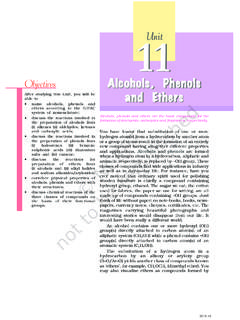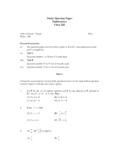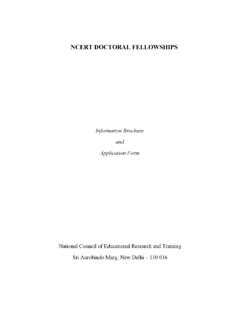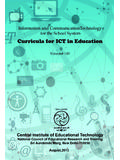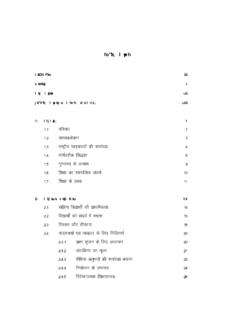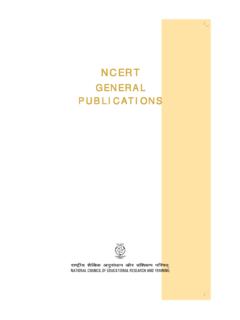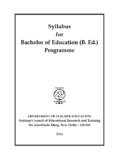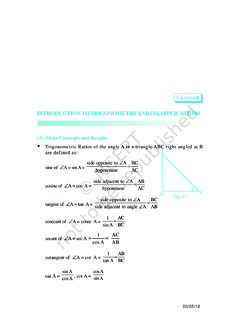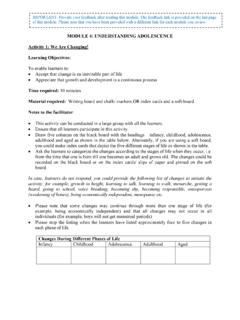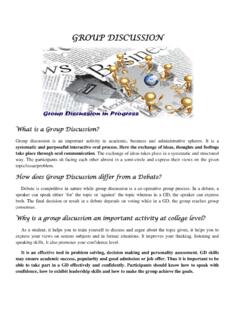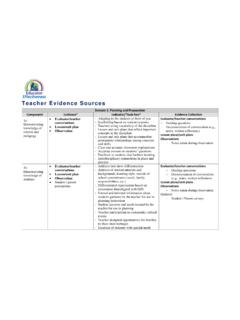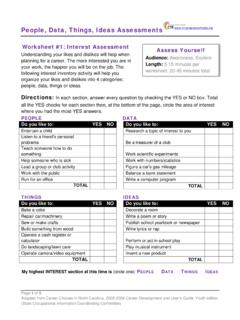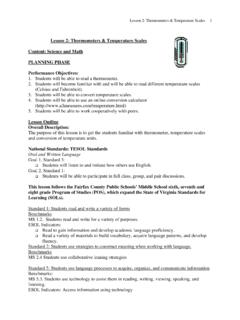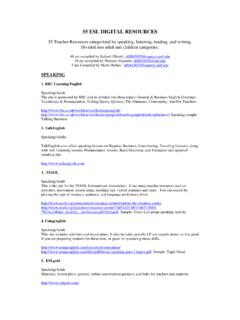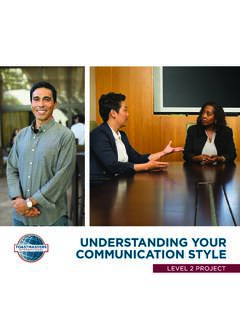Transcription of Unit 2 Self-management Skills - NCERT
1 SeSSion 1: Strength and WeakneSS analySiSHave you ever wondered why you get good marks in one subject and not such good marks in another? Knowing what you do well or not so well, will help you in converting your weakness into strength and strength into an exceptional talent. A strength and weakness analysis helps you in this process. Strength and weakness analysis begins by knowing and understanding one s self first. Let us first understand some terms which can help you in doing the of Some Important TermsBeliefsBelief is a feeling of certainty that something exists and is true,especially one without proof. For example, one s belief in a friendship or are principles or standards of behaviour; one s judgement of what is important in life.
2 They have a major influence on a person s behaviour and attitude UnitUnitSelf- management Skills2 Employability Skills ClaSS Xi70and serve as broad guidelines in all situations. Some common good values are honesty, equality, community involvement, simply means things you enjoy or love doing. For example, solving mathematical problems or playing a is the opposite of like; you disapprove it or do not enjoy doing it. For example, dislike towards someone who doesn t treat people means a view or judgment formed about something, not necessarily based on fact. For example, an opinion about someone s career refers to a person s experiences, training and education. Background may emerge from type of childhood, education or type or family, is a set of behavioural or personal characteristics by which an individual is recognisable as a member of a group.
3 Identity may emerge from the citizenship, religion or caste of a person. Your identity is the sum of your opinions, beliefs, values, likes, dislikes, religion, etc. It is important to know who you are, because only then can you measure your strengths and weaknesses. Knowing YourselfKnowing yourself means understanding who you are, what you like, what you dislike, what are your beliefs, what are your opinions, what is your background, what you do well and what you do not do well? It is important to know who you are, because only then can you measure your strengths and weaknesses (see Figure ).Figure Knowing YourselfUnit 7014-03-2019 11:02:56 Self-management SkillS71 Strength and Weakness AnalysisBeing self -aware or understanding Who am I?
4 Means looking outside the usual characteristics, such as name, qualifications, the relationship one has with others. It actually means knowing our inner strengths, hidden talents, Skills and even weaknesses. Let us look at what are one s strengths and weaknesses (Figure ).Strengths or Abilities are what one does well and is good at. Everybody has some strengths. For example, a person is good at solving math problems or plays cricket well, , also known as 'areas of improvement' are what one does not do well and is not good at. Everybody has some weaknesses too. For example, a person cannot wake up on time or is not able to cope up with pressure, etc. Figure Strength and WeaknessTechniques for Identifying Your Strengths and WeaknessesTo identify the strengths and weaknesses think about the activities that you enjoy doing and those that you do not like to do (Figure ).
5 Finding your Strengths Take time off to think about what you do well Think of anything that you are always good at Think of what others appreciate about youFinding your Weaknesses Point out the areas where you struggle and what you find difficult to do Look at the feedback you receive about yourself from others Be open to feedback and accept your weaknesses without feeling bad about it. Look at it as an area of on that information, we can place what we can do to improve ourselves By improving we will feel confident about ourselvesBy understanding ourselves we can know what we can and cannot doFigure Finding strengths and weaknessesUnit 7114-03-2019 11:02:59 Employability Skills ClaSS Xi72 Here are few questions that can help you find your strengths and weaknesses (Figure ).
6 How am I different from others? What do I do better than others? What do other people admire in me? What makes me stand out? Where do I worry and struggle? Where, how and why do others perform better than me? What advice for improvement do I often receive from others?Figure Questions for Finding Strength and WeaknessDifference between Interests and Abilities Interests are the things that we enjoy doing. Interests can be activities you like to do in your free time that makes you happy. activities you are curious about or would do even if no one asked you to do it. activities you want to learn or would like to do in the interests may not match abilities. In those cases, you can either improve your abilities or follow some other path.
7 For example, you may like cricket (interest), but you may not be good at playing the game. In that case, just play for fun but do not aim for a career in cricket!The teacher will facilitate these activities by showing you the e-learning module for this lesson via The module will include videos and e-content for the above topics as well as detailed instructions for some activities thinking activityAfter watching the initial video Finding the right job in the e-learning lesson, write down the points that you will use from the video to understand your own strengths and 1 Pair-work Aim in LifeMaterial requiredPen/pencil, notepad or sheets of paperUnit 7214-03-2019 11:02:59 Self-management SkillS73 Procedure1. Form pairs of students. 2.
8 Make a list of tasks or activities you all can do well. Write your aim in life. Share your notes with your partner and discuss your personal characteristics. 3. One volunteer comes and reads in front of the class. Here is the format for you to fill in: List what you believe you are as a person by starting the sentences with I am (for example, I am a sensitive person.) Next list all you can do well by starting the sentences with I can (for example, I can identify safety networks and seek support when witnessing or experiencing violence and abuse.) List what you plan to do by starting the sentences with I will (for example, I will train myself in yoga). Finally, state your aim in life. Start the sentence with My aim is (for example, My aim is to become an accomplished sports-person.)
9 Making a list will help you become 2 Assignment Preparing the interests and abilities worksheetMaterial requiredStudent textbooks, penProcedure1. Each student has to complete two worksheets, each containing a list of statements. First worksheet is for interests and the second is for Each student has to be real and honest when marking the statements in the two worksheets as it is for their own understanding of themselves. If they are not real and honest, they will get incorrect results about their own interests and Based on your interests, think of a career you would like to have. Now see if you have the ability to follow this career. This will help you identify what career is best for 1: What are my intereStS?
10 1: Interests enjoy working with a group of love to make new feel comfortable around new 7314-03-2019 11:02:59 Employability Skills ClaSS like listening to people who have thoughts different than like to report the problems in my locality to the Municipality or like responding to people like organising like to resolve conflicts between 2: Interests like working with enjoy making things with my own like to move around a like to use gestures and non-verbal cues when I like to learn by like playing sports like assembling parts of instruments or machine using 3: Interests enjoy learning about like to do experiments at like my things to be like to see a pattern or logic in things that happen around like to save out of my pocket enjoy collecting coins or like to make and follow a 7414-03-2019 11:02:59 Self-management 4: Interests like giving directions to want to learn new concepts and express my ideas enjoy creating new product prefer pictures over text in a enjoy like solving jigsaw or visual like redecorating the room for enjoy working with different 2: What are my abilities?
